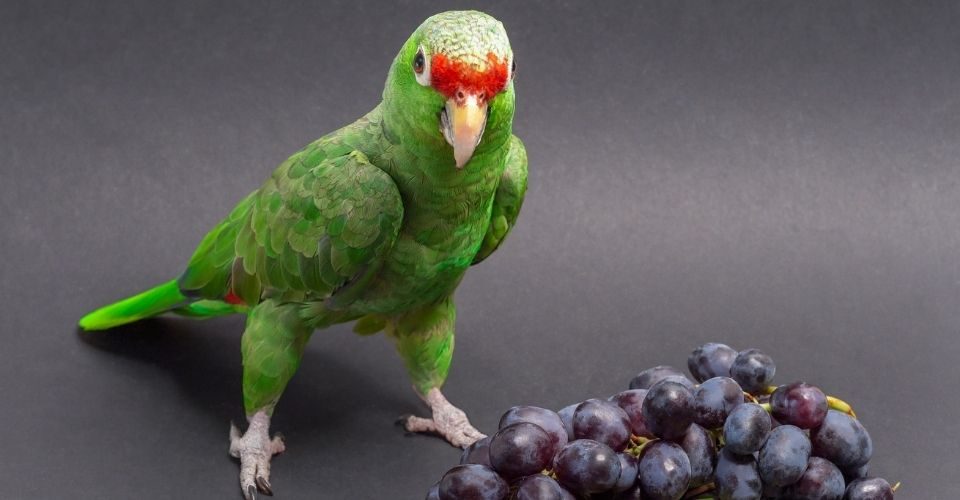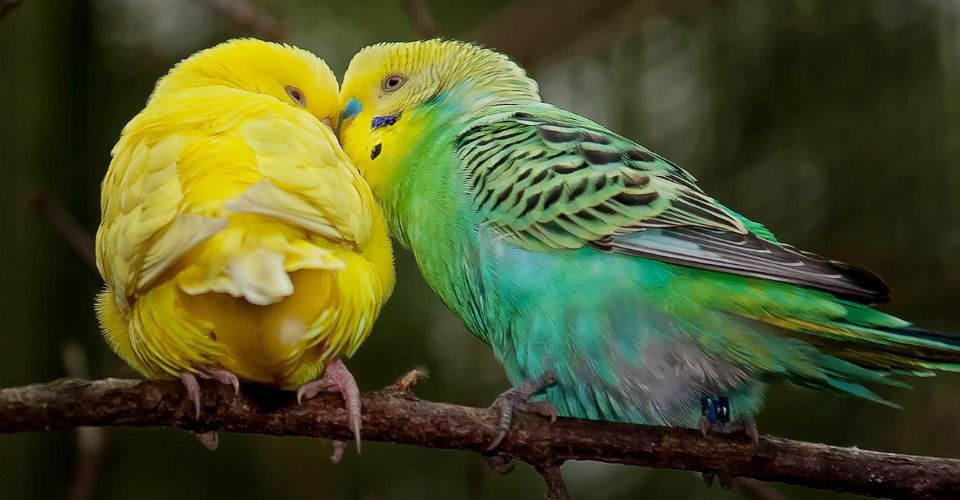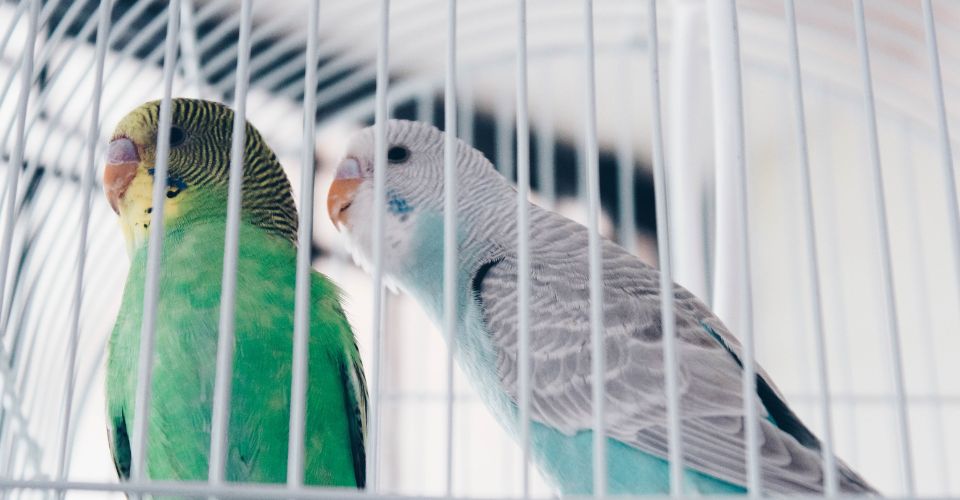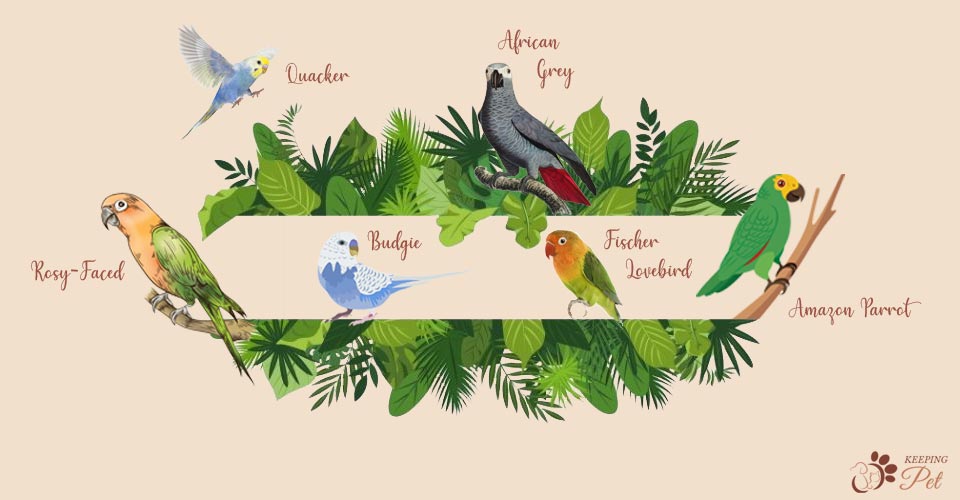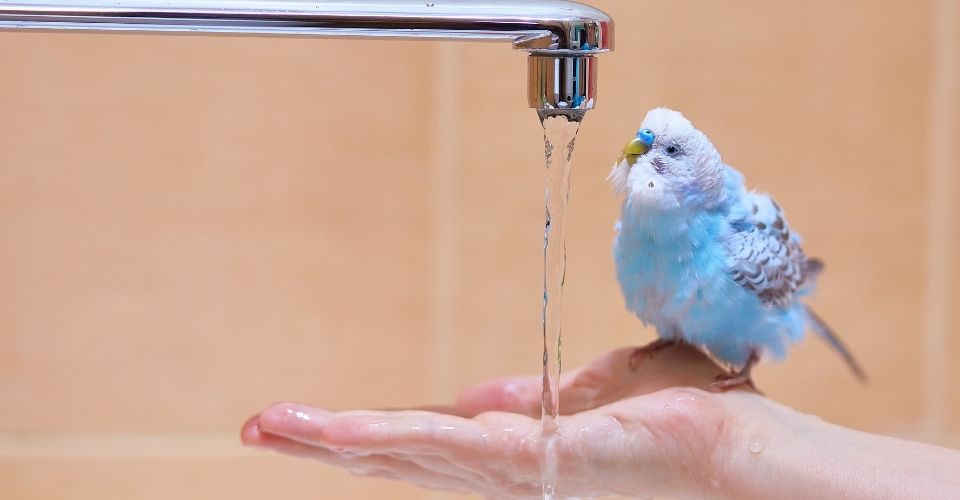Summer comes with many refreshing fruits, like strawberries, mangoes, watermelon, grapes, etc. But the fruits you love to eat may not be of any value to your pet, be it a cat, dog, or parakeet—or, conversely, it may offer significant benefits.
What about grapes? Can parakeets eat grapes? Is there any nutritional value for parakeets eating grapes?
The answer is a bit complicated. But we will try to cover every aspect of parakeets and grapes in this blog.
Parakeets and Grapes
Since grapes are rich in minerals and vitamins necessary for humans, one may think that they will be a good treat for their little budgies, too. And why not? If strawberries and watermelon are healthy snacks for parakeets, grapes will probably be good, too?
Well, that might be the option, but as a responsible pet owner, you should avoid giving any new food to your pet bird unless you are sure about the food’s nutritional value or have a vet’s approval. According to the standard parakeet diet chart (shown below), fruits and vegetables constitute 30 % of their total diet. It is essential to provide them with seasonal fruits to fulfill their nutritional requirements. Does the same hold true for grapes too? Can parakeets eat grapes?
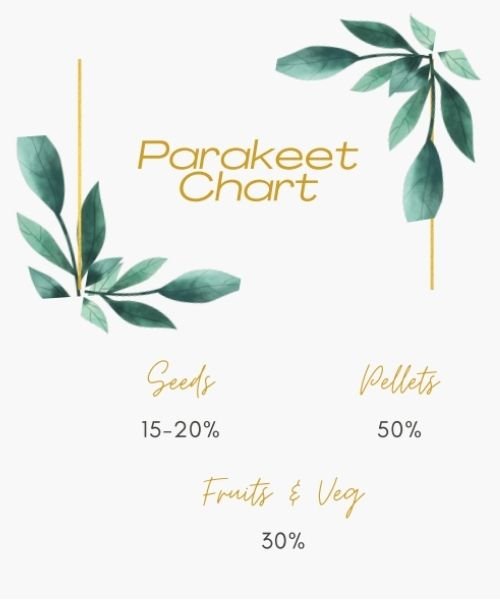
Can Parakeets Eat Grapes?
As we said earlier, the answer is a bit complicated. But a ‘too long to read’ answer will be: Yes, parakeets can eat grapes.
If you have grapes and want to share some with your bird, you can—it will be a great treat or snack for them. But grapes alone can’t be the main meal for your bird because they contain high water and fructose content.
A high level of fructose gives a lot of energy to the bird, but too much sugar is also a source of health hazards for parakeets.
Overall, it is a safe fruit for parakeets if only given in moderation.
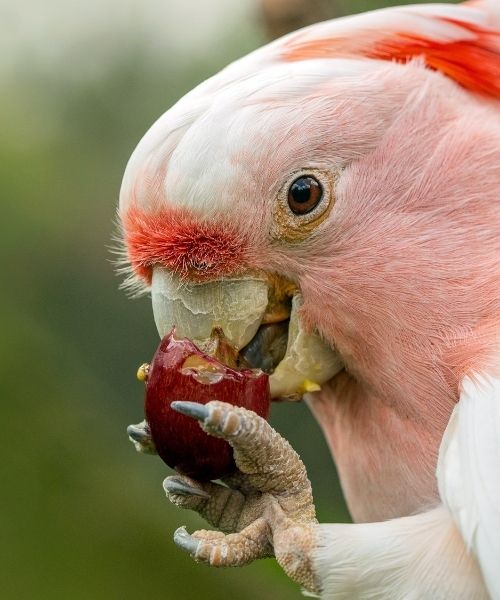
Nutritional Benefits of Grapes for Parakeets
Parakeets love grapes because they are sweet. But that is not the only reason a parakeet should munch on grapes. Grapes have, in fact, many nutritional benefits for parakeets, too.
Grapes are a great source of vitamin A, C, and proteins, which contribute a lot to the health of your bird. In addition, grapes contain 82% water, which keeps the bird hydrated in summers.
Below is the nutritional chart of 1 grape (10gram), according to the USDA (US Department of Agriculture).
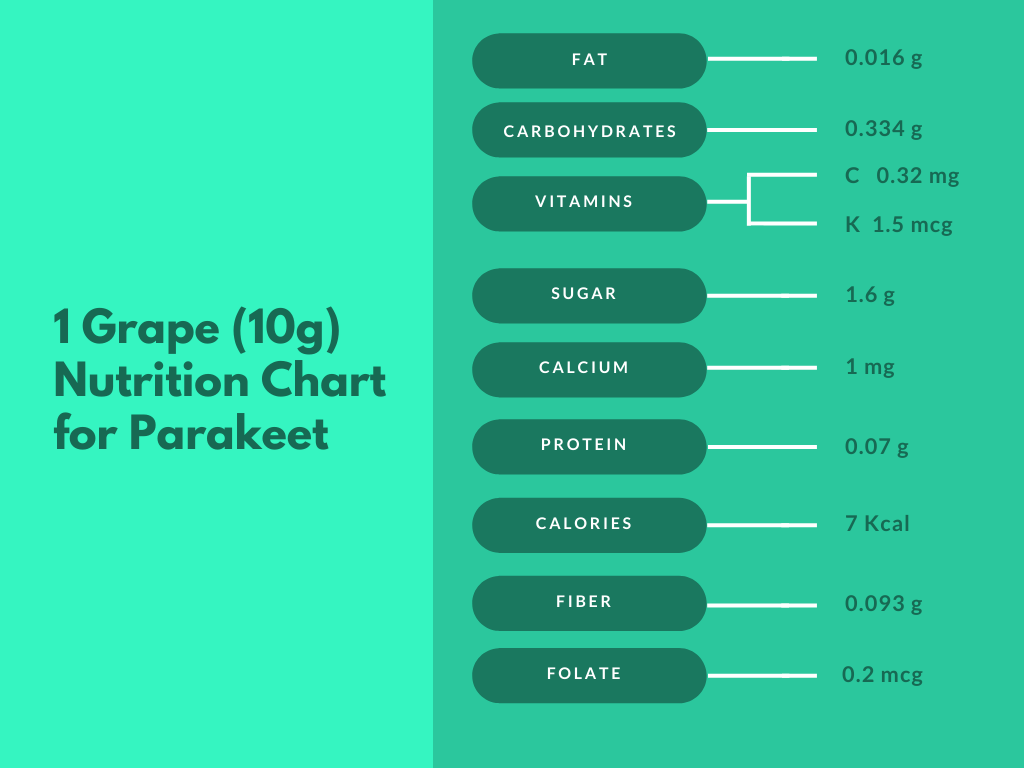
1. Vitamin C and K
Vitamin C is essential for birds, especially when they are under stress. They also require vitamin A for reproduction, maintenance of epithelial cells, and normal growth.
During the breeding season, Vitamin K deficiency causes blood spots in the egg and hemorrhage in the breast and legs of female parakeets.
Grapes are rich in vitamin K, as 10gram of grape contain 1.5mcg of vitamin K. Additionally, it helps against coccidiosis and improves the clotting mechanism and wound healing in the bird.
2. Folate
Folate helps in the cell functioning and tissue development of birds. It helps parakeets grow fully and is also essential to the development of white and red blood cells as well as in cell division and tissue development.
3. Fiber
Cellulose fiber improves the birds’ digestive system as it feeds the healthy bacteria in the guts, which in turn helps a parakeet with digestion.
Grapes are an excellent source of cellulose that helps in bowel movement and digestion of food, thus preventing parakeets from many potential diseases.
It is true that grapes are considered a healthy fruit for parakeets, but as the old maxim goes, “excess of everything is bad.” Feed them in moderation so that they can enjoy their snack for a long time. Overdo it, and they will get sick.
Benefits of Grapes
Based on the nutrient profile of grapes, some benefits of grapes for parakeets are mentioned below.
a) Maintain Water Balance
Grapes have higher potassium and lower sodium content, which balances the electrolytes and eliminates the toxins and excess water in the body.
Thanks to its 82% water content, grapes also prevent birds from dehydration, especially in summers.
b) Regulate Blood Pressure
High potassium content help balance the electrolytes of the body, which controls the adverse effects of salts and lowers blood pressure.
According to the US Fish & Wildlife Service, high blood pressure is hazardous for birds—almost 2% of total bird deaths per year are caused by irregular blood pressure.
c) Boost Immunity
Grapes are loaded with vitamin D, which enhances the genes’ activity, boosting the bird’s immunity. Can Parakeet Eat Grape Seed?
Parakeets enjoy sweet snacks, that’s why grapes are their favorite treat along with other foods. But what about grape seeds?
Unlike apple seeds, grapes seeds are completely healthy for parakeets. Adult parakeets enjoy seeded grapes. But avoid feeding seeded grapes to the baby parakeets. They are too young to digest and even can choke on them. It is better to save them for the adult ones.
Parakeets love a seed-based diet, but it should be complemented with a pallet-based diet. Relying solely on seeds can cause not only obesity in parakeets but also lack all the essential nutrients for their growth.
Can Parakeet Eat Grape Peels?
Grape peels are not harmful to parakeets. But sometimes, they are covered with pesticides, making them deadly for pets as well as humans. In addition to being a source of many other issues, pesticides affect parakeets’ digestive and immune systems. According to recent research by Pesticide Action Network, 99% of grapes are contaminated with pesticides.
Thoroughly wash the grape before feeding it to your bird, or the even better option is to remove the peel and feed them the fruit and its seeds.
Can Parakeets Eat Dehydrated Grapes?
Yes, parakeets can eat dehydrated grapes, also known as raisins.
And the good thing is that parakeets tend to enjoy dehydrated grapes more than their fresh counterparts. They are sweeter, and their texture is so soft and easy to bite.
Dehydrated grapes are even added to the commercial food of the parakeets.
They are enriched with added sugars, and only 1-2 raisins per day are enough for parakeets.
Health Hazards of Grapes for Parakeets
High fructose content in grapes can be a source of health hazards for parakeets. If given in excess, birds may find themselves prone to:
i. Obesity
More sugar content means more chances of a bird growing obese. Parakeets start gaining weight, prefer to sleep, and avoid exercise, causing severe health issues, like blood clotting, hemorrhage, and prolonged sickness.
ii. Diabetes
It is a severe condition caused when parakeet is given fruits—rich in sugar—as the main course. Look for these symptoms of diabetes in your pet.
- Sudden weight loss
- Increase in water intake
- Infectious body and prolonged illness
- Coma and seizures
Feeding Grapes to Parakeets the Right Way
1) Rinse It Thoroughly
Wash the grapes properly before giving them to parakeets. Avoid giving them the grape peels if possible because of pesticides.
A small amount of pesticide or chemical is enough to disturb your bird’s health.
If possible, wash them using vinegar or baking soda—the wax-like coating of grapes are full of contamination—that will help remove any residue chemical on the grapes.
2) Cut Them into Smaller Chunks
Bring either small size grapes for your parakeet, or cut them into smaller chunks. This will help parakeets consume grapes easily, not choking on them.
If necessary, remove the seed of the grape or get seedless grapes for the baby parakeets.
So, can parakeets eat grapes? As you would see, the answer is yes. Grapes are a healthy snack for parakeets full of nutrition and minerals. But to utilize all the benefits grapes provide, you’ll have to feed it—or any other fruit—to your parakeet in moderation and according to the parakeet food chart. Otherwise, simple fruit like grapes can cause serious health hazards for your little bird.

